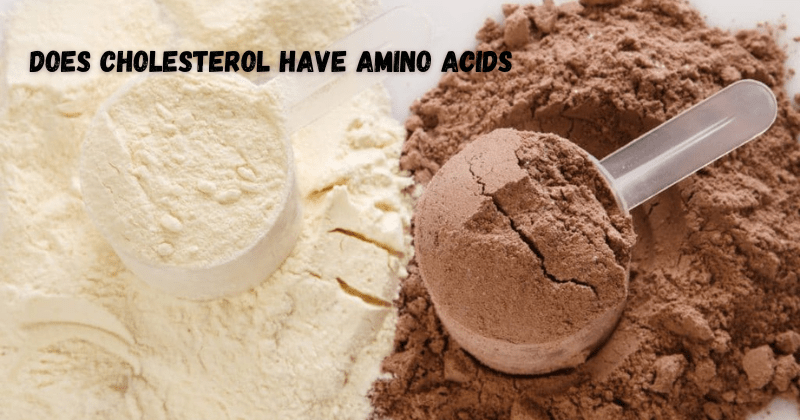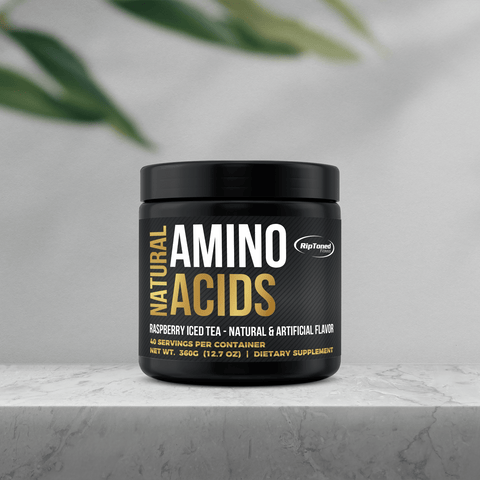
Does Cholesterol Have Amino Acids
Share
Cholesterol is a waxy, fat-like substance that is found in all cells of the body. It plays an important role in the production of hormones, vitamin D, and digestive juices. However, high levels of cholesterol can increase the risk of heart disease and stroke. This has led to widespread concern about cholesterol levels and how to manage them.
One potential solution for lowering cholesterol is through the consumption of amino acids. Amino acids are the building blocks of protein and have been linked to various health benefits, including reducing cholesterol levels. However, there is still debate over whether cholesterol contains amino acid residues or acids. In this article, we will explore the relationship between cholesterol and amino acids and determine if it can be a viable way to manage cholesterol levels.
What is cholesterol, and why does it matter to our health?
Cholesterol is a vital substance that our bodies need to function properly. The liver produces it and can also be consumed through certain foods, such as animal products like eggs and meat. Cholesterol plays a key role in producing hormones, vitamin D, and bile acids that aid digestion.
Too much cholesterol in the human body can lead to health problems, particularly in plaque buildup in our arteries. This can increase the risk of heart disease and stroke, which are leading causes of death worldwide.
To manage cholesterol levels, it is important to understand the different types of cholesterol. Low-density lipoprotein (LDL) or "bad" cholesterol can build up in your blood pressure and the walls of your arteries, leading to blockages. High-density lipoprotein (HDL) or "good" cholesterol helps remove excess cholesterol from the blood and carries it back to the liver, where it can be broken down.
For optimal health, it is recommended to have low levels of LDL and high levels of HDL in our bodies. This can be achieved through a healthy lifestyle that includes regular exercise, avoiding smoking, and maintaining a well-balanced diet.
Breaking down the structure of cholesterol and what makes up fatty acids
Cholesterol is a unique lipid molecule with a complex structure. It consists of four linked carbon-based rings, hence its classification as a cholesterol molecule and a steroid. These rings are made up of hydrogen and carbon atoms and vary in the number and arrangement of their double bonds.
In cholesterol molecules, in addition to these carbon-based rings, cholesterol also contains a hydrocarbon tail that can vary in length and saturation. This tail is made up of fatty acids, which are long chains of carbon atoms with a carboxyl group (COOH) at one end.
Fatty acids are essential components of our diet and can be classified as saturated, monounsaturated, or polyunsaturated, depending on the number of double bonds they contain. Saturated fatty acids have no double bonds and are typically solid at room temperature. In contrast, unsaturated fatty acids have one or more double bonds and tend to be liquid at room temperature.
Cholesterol contains mostly saturated fatty acids, which makes it solid at body temperature. However, it also has some unsaturated fatty acids, which give it a slight degree of flexibility in structure. This unique combination of lipids makes cholesterol an essential and functional component of our cellular membranes.
Does Cholesterol Have Amino Acids
The main question that arises is whether cholesterol itself contains other amino acids. The simple answer is no, it does not.
Cholesterol is a lipid molecule and does not contain any amino acids. However, some research suggests that consuming certain amino acids can help lower cholesterol levels.
For example, studies have shown that an amino acid called leucine may reduce LDL and total cholesterol levels in the blood. Another amino acid, arginine, has been linked to increasing HDL cholesterol levels.
These amino acids are believed to work by inhibiting the enzymes responsible for producing and breaking down cholesterol in the body. However, more research is needed to fully understand how amino acids can impact cholesterol levels and whether they can be a reliable method of managing them.
Different types of fats and how they can affect your cholesterol levels
Fats are an essential part of our diet and play a crucial role in maintaining good health. However, not all fats are created equal, and some can significantly impact our cholesterol levels.
Saturated and trans fats, commonly found in animal products, fried foods, and processed snacks, can increase LDL or "bad" cholesterol levels in the body. This is because they can cause inflammation and blockage in the arteries, leading to plaque buildup.
On the other hand, unsaturated fats in plant-based foods like avocados, nuts, and olive oil have been shown to lower LDL cholesterol levels and increase HDL or "good" cholesterol levels. These healthy fats also provide essential fatty acids our bodies need to function properly.
It is important to note that the type of fat we consume is just as important as the amount. For example, while consuming too much-saturated fat can be harmful, replacing it with excessive amounts of unsaturated fats can also have negative effects on our health. Moderation and balance are key when it comes to incorporating fats into our diet.
Additionally, trans fats should be avoided altogether as they not only raise LDL cholesterol levels but also lower HDL levels. These fats are commonly found in processed and packaged foods, so it is important to read labels carefully and choose healthier alternatives.
Foods that contain amino acids that can help lower your cholesterol levels
In addition to incorporating healthy fats into our diet, consuming certain amino acids may also positively impact our cholesterol levels. Some foods that contain these essential amino acids include:
- Legumes: Beans, lentils, peas, and peanuts are all rich sources of leucine, an amino acid that has been shown to reduce LDL cholesterol levels.
- Fish: Fatty fish like salmon, tuna, and mackerel are great sources of omega-3 fatty acids, which have been linked to decreased levels of triglycerides and increased levels of HDL cholesterol.
- Whole grains: Whole grains like oats, barley, and quinoa contain a type of fiber called beta-glucans that can help lower LDL cholesterol levels.
- Nuts: Almonds, walnuts, and cashews are all rich in arginine, an amino acid that has been shown to increase HDL cholesterol levels.
- Leafy greens: Spinach, kale, and other leafy greens contain plant sterols, which can help block the absorption of cholesterol in the body.
- Fruits: Fruits like apples, grapes, and berries contain pectin, a soluble fiber that can help lower cholesterol levels.
Including these foods in a well-balanced diet can have numerous benefits for our overall health, including helping to manage cholesterol levels. However, it is important to remember that making healthy lifestyle choices and consulting a healthcare professional are vital for maintaining optimal cholesterol levels.
Smart lifestyle choices for a healthier heart and lifestyle overall
While diet plays a significant role in managing cholesterol levels, other lifestyle choices can also positively impact our heart health and overall well-being.
- Exercise regularly: Regular physical activity has been shown to increase HDL cholesterol levels and decrease triglyceride levels. Aim for at least 30 minutes of moderate exercise most days of the week.
- Quit smoking: Smoking not only increases LDL cholesterol levels but also damages the lining of our arteries, making it easier for plaque to build up. Quitting smoking can significantly improve heart health and reduce the risk of heart disease.
- Manage stress: Chronic stress has been linked to an increase in LDL cholesterol levels. Find healthy ways to manage stress, such as exercise, meditation, or talking to a therapist.
- Maintain a healthy weight: Being overweight or obese can increase LDL cholesterol levels and put unnecessary strain on our hearts. Aim for a healthy weight through regular exercise and a balanced diet.
- Limit alcohol consumption: Excessive alcohol consumption has been linked to high triglyceride levels and can also contribute to weight gain. Limit alcohol intake to one drink per day for women and two for men.
- Get regular check-ups: Regular health check-ups can help detect any underlying health conditions contributing to high cholesterol levels. Consulting with a healthcare professional for proper diagnosis and treatment is important.
Taking care of our heart health should be a priority in our daily lives. By making smart lifestyle choices, incorporating healthy foods into our diet, and regularly monitoring our cholesterol levels, we can work towards a healthier heart and a better overall quality of life.
FAQs
Do foods high in cholesterol contain amino acids?
Certain foods high in cholesterol, such as eggs and meat, contain amino acids. However, these foods also tend to be high in saturated fats, which can raise LDL cholesterol levels. A balanced diet with sources of healthy fats and amino acids from plant-based foods is recommended for managing cholesterol levels.
Are there any side effects of consuming too many amino acids?
Consuming excessive amounts of certain amino acids may have negative side effects, such as digestive issues or an increased risk of kidney stones. Following a well-balanced diet and consulting with a healthcare professional before making any significant changes is important.
Can supplements help lower cholesterol levels?
Certain supplements, such as red yeast rice and plant sterols, have been shown to help lower cholesterol levels. However, it is important to consult with a healthcare professional before taking any supplements, as they may interact with other medications or have potential side effects.
Conclusion
In conclusion, cholesterol, fat metabolism, and amino acids have a complex relationship in our bodies. While cholesterol is essential for various bodily functions, excess levels can negatively affect health. Luckily, by making smart lifestyle choices and incorporating foods rich in healthy fats and amino acids into our diet, we can manage our cholesterol levels and improve our overall heart health.
It is important to remember that everyone's body is unique, and what works for one person may not work for another. Consulting with a healthcare professional is crucial for proper diagnosis, treatment, and personalized recommendations for managing cholesterol levels.
By staying informed and making conscious decisions about our diet and lifestyle, we can take control of our heart health and lead a happier, healthier life. So, it is important to keep a balance between cholesterol levels and amino acids in our daily diet.

Check out Rip Toned's Amino Acids here
